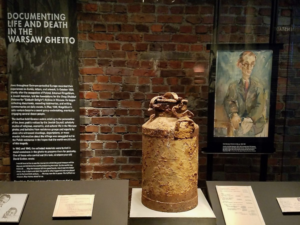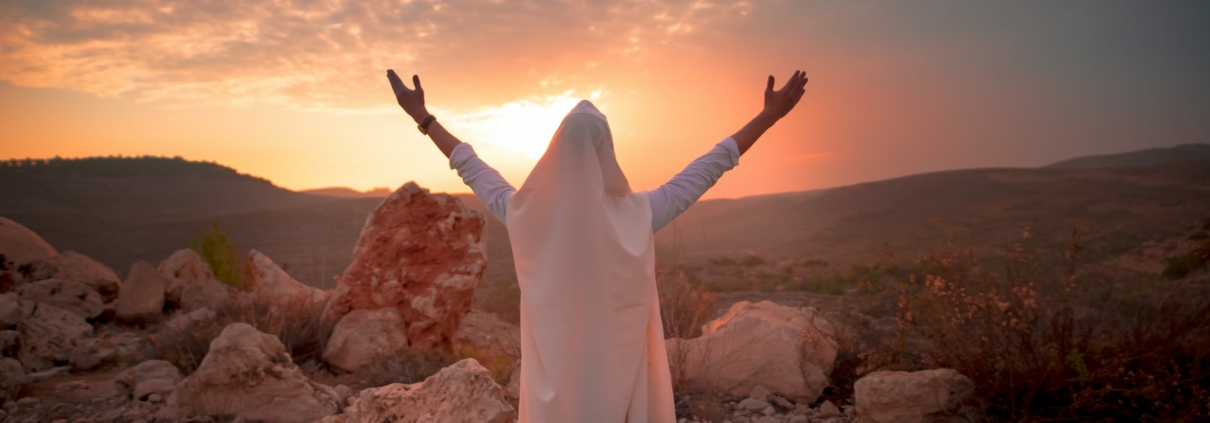Testing My Faith
The opening chapters of Exodus torment me. God waited decades to respond to the cries of the Hebrews in slavery. What kept the people resolute and strong while waiting for their redemption? I thought about the inspiration that sustained Jews during the Second World War. Most emblematic of that faith was the rabbi of the Warsaw Ghetto.
Rabbi Kalonymus Kalman Shapira was a spiritual leader in the Warsaw Ghetto. He is also known as the Aish Kodesh, or holy fire. Conditions in the Ghetto were abysmal; food was scarce, and disease decimated the four hundred thousand Jews imprisoned there. In that hellhole, Rabbi Shapira continued to run a secret synagogue, leading services, and delivering lectures to Jews there. He arranged marriages and helped arrange a mikveh, a Jewish ritual bath. Each week, he wrote down his thoughts on that week’s Torah portion. Before the ghetto was destroyed, Rabbi Shapira buried his sermons for the world to find after the war.
While facing imminent death, Rabbi Shapira sustained people living in horrendous danger. Shapira gave people the strength to see meaning in even the difficult parts of life as part of a larger Divine plan.
Rabbi Shapira’s words recall the wisdom of Proverbs 3:5,
בְּטַ֣ח אֶל־יְ֭הֹוָה בְּכׇל־לִבֶּ֑ךָ וְאֶל־בִּ֥֝ינָתְךָ֗ אַל־תִּשָּׁעֵֽן׃
“Trust in the LORD with all your heart,
And do not rely on your own understanding.”
Faith is how Shapira believed that a person could sustain themself in difficult times. For Rabbi Shapira, acceptance of God’s ways lessened the pain at what was happening. He taught that, with faith, a person can bear more distress. Faith has the power to boost spirits, even when, God forbid, salvation does not come as hoped.
I understand Rabbi Shapira to have said either God will rescue us or God has a really good reason for our suffering. While Shapira’s faith burned with holy fire, his approach unnerves me. I have concerns about relying on God whose plan includes horrendous suffering. As opposed to Rabbi Shapira, I rely less on faith and more on actions. I rely less on God and more on people. For me, humans should be God’s Task Rabbits. The God in whom I have faith gave us the ability to repair the world with our own holy activities.
I don’t pretend that anything in my life, or in the lives of any of my contemporaries compares to the experience of the Shoah. In that truth, lies a personal difficulty. Rabbi Kalonymous Shapira, the rabbi of the Warsaw Ghetto, had absolute faith in God while living in Hell. By comparison, I have cautious faith in God. My questioning faith pairs well with my suburban life in Potomac. When I most want a spiritual connection, I might hike mountains seeking God. I sometimes photograph beautiful scenery hoping to capture transcendence.
After the Shoah, many Jews lost faith. As Rabbi Yitz Greenberg has explained, the destruction of European Jewry demands that we choose to enter again the covenant with God. To thoughtfully reenter the covenant with God requires pondering questions about God’s true nature. We evaluate God by standards of timeliness, skill, and engagement. For me, the Shoah begs these questions. When does God’s salvation come? Is God able to rescue and redeem? If God is listening, then why isn’t God acting?
For now, I am filled with questions – but I am also bursting with wonder and appreciation. I have wonderment for the Creator and appreciation for the world that was created. That is my faith, the faith of Rabbi Evan J. Krame of Potomac.






 Evan J. Krame was ordained as a rabbi by the
Evan J. Krame was ordained as a rabbi by the